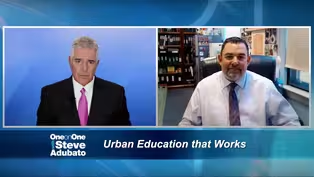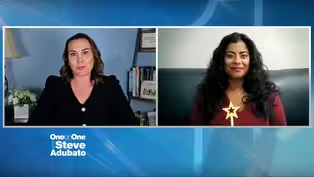One-on-One
Newark Symphony Hall's opportunities for urban artists
Clip: Season 2025 Episode 2778 | 9m 35sVideo has Closed Captions
CEO of Newark Symphony Hall talks opportunities for Black & Brown artists
One-on-One Senior Correspondent Jacqui Tricarico talks with Talia Young, President and CEO of Newark Symphony Hall, to examine the importance of affordable and accessible opportunities for Black and Brown artists in urban areas.
Problems playing video? | Closed Captioning Feedback
Problems playing video? | Closed Captioning Feedback
One-on-One is a local public television program presented by NJ PBS
One-on-One
Newark Symphony Hall's opportunities for urban artists
Clip: Season 2025 Episode 2778 | 9m 35sVideo has Closed Captions
One-on-One Senior Correspondent Jacqui Tricarico talks with Talia Young, President and CEO of Newark Symphony Hall, to examine the importance of affordable and accessible opportunities for Black and Brown artists in urban areas.
Problems playing video? | Closed Captioning Feedback
How to Watch One-on-One
One-on-One is available to stream on pbs.org and the free PBS App, available on iPhone, Apple TV, Android TV, Android smartphones, Amazon Fire TV, Amazon Fire Tablet, Roku, Samsung Smart TV, and Vizio.
Providing Support for PBS.org
Learn Moreabout PBS online sponsorship(upbeat music) - Hi, I'm Jacqui Tricarico, Senior Correspondent for One-on-One, and I am so pleased to be joined now by Talia Young, the President and CEO of Newark Symphony Hall, an arts and cultural staple here in New Jersey.
Talia, so great to have you on the program.
- Oh, definitely, the pleasure is mine.
- So first, when we're talking about the Newark Symphony Hall, when I logged onto the website, right there, big and bold, it says, "Art is now, art is impact, art is service."
Describe that mantra and what that means to you and your colleagues and how you're implementing it there at Newark Symphony Hall every day.
- Wonderful point to start with.
I just started as President and CEO two years ago.
I've worked in Newark for over 15 to 20 years.
And what I noticed about Newark Symphony Hall, that we were more than just a historical institution located in the middle of downtown, but we were an anchor institution in the Lincoln Park Arts and Cultural District.
And what we needed to communicate externally, not even to our supporters, our community, but also to ourselves, the capacity that we have to be that anchor.
So we needed to communicate that art is happening now inside of our building, art in the service that we do impacts our community, and really just understanding the whole holistic impact that this institution has in our community.
So I think it's the power of words per se.
- Right, right.
And you mentioned that history, you're coming up on the centennial in 2025.
We're taping this in October of 2024, but in 2025, it's 100 years of this building being there in Newark and a staple in Newark, but there's been a lot of evolution over those years.
Talk about the history of the building itself and kind of how it's grown to what it is today.
- So in September of 2025, the building would be 100 years old, which is extremely exciting to tell the story of what the evolution of the building really is.
The building was erected as the Mosque Theater, where it was a community, still community hub, and then it evolved into a performance art institution where the city took it over as a municipal entity about 30 years ago.
So since that transition into the municipal owners, we became the nonprofit that manages the institution.
And doing that is ensuring that the community has continued access to the building.
There is a priority of inclusion and diversity here at the institution.
But I think that the powerful thing about it is because it has that longevity of history, the evolution of culture, music, art, arts education, we have been that home in Newark.
So when you look at the symphony and classical music, then the evolution into jazz, the evolution into hip hop, the evolution into the art that is now, we've seen it all on our stage.
And I think that is what we're gonna be celebrating and talking about and really connecting those dots across time.
And then what we're gonna do moving forward.
- It sounds like what's happening inside that building is being representative of what's happening outside of that building throughout Newark.
And like you said, such an arts and cultural hub there in Newark.
Talk about how important it is to have a dedicated and affordable, accessible space really for black and brown artists, especially in urban areas.
- We are reflective of our city and the city of Newark is a home of artists, right?
It's historically been home of artists and that literally was what happens on our stage.
So we do provide accessible art base for black and brown students, mature artists, emerging artists, young talent, and we do it in multiple factors.
One, providing the space, two, allowing real arts education and access to sustainable jobs and creating pipeline.
Say through our production assistant courses, our theater classes, and really hands-on activation here with the partners, T.G.
Partners, the school district, Newark Arts Council, all community-based organizations that exist here.
So it is really that space for creative space and creative activation that happens in our city, but they have that accessible component to our location at Newark Symphony Hall.
- You talk about pipelines and it's really become a pipeline to the entertainment industry in many ways.
We know that New Jersey has really been thriving when it comes to the film and television industry.
So many production companies coming here to film.
How important are those programs?
Like you mentioned, talk a little bit more about that production assistant training program.
I wanted to learn a little bit more about that and other programs that you're offering the students that are coming through those doors to really help them get on the path to be able to pursue those jobs in the state of New Jersey.
- Yeah, I think it's a very exciting time for the state of New Jersey with the leadership of Governor Murphy and really activating that tax credit incentive.
It has driven business to New Jersey from the film industry.
And as a union building, we know from our day-to-day how unions interact into that field, right?
And what we have to do is really create the connection point to the unions, which is stable labor, stable workforce and economy, and creating that access with local artists.
So what a lot of people do not know is that we shoot a film, movie, commercial at least once a month here at Newark Symphony Hall.
Our property is ideal for production, filming, and really the historical environment of it.
So what we notice is that the best way to diversify the unions and the trade unions is get hands-on access in creating pipelines.
And to do that, we created this workforce labor program, which is production assistance, specifically lighting design for stage or film, sound for lighting, for stage or film, and as well as bootcamp.
So when people get the opportunity to get on a set and be a PA, which is really the ground level, mostly, you know, of this industry, they feel comfortable.
They've had the training, they're equipped, and they're prepared.
So when that call happens, they're ready for it.
And I think the critical thing that we're doing is making sure that we can create that pipeline.
So as the film industry blossoms here in Newark, here across the street, we can be a source to diversify the PA, well-trained, access, and then having that pipeline.
- Part of this Celebrating 100 Years, part of that is really this massive expansion that's happening.
Give us a minute or less on the expansion and what we can see happening at Newark Symphony Hall over the next year or so.
- So again, under the leadership of the governor, as well as our mayor, Ras J. Baraka, they have invested in this institution, understanding that if funds directly do not go into it and preserving this institution, we won't have a future.
So over the last four years, we've raised over $20 million to restore and reactivate this institution.
We completed phase one.
It's a five-phase project.
We completed phase one last summer.
But we're going into phase two in January to point $10.9 million, which will open up the arts education lab here at Newark Symphony Hall, bring back the marquee, and then just also health and safety protocols to really be able to activate 200,000 square feet of space.
- And it sounds like all that to really keep restoring the building, keeping it a center of Newark and making sure it's there for all the residents throughout Newark and beyond.
So thank you so much, Talia, for sharing more about Newark Symphony Hall, what's going on there and how it's benefiting the city and the rest of us here in New Jersey.
- Definitely my pleasure.
- Thank you so much.
We'll be right back after this.
- [Narrator] One-On-One with Steve Adubato is a production of the Caucus Educational Corporation.
Celebrating 30 years in public broadcasting.
Funding has been provided by New Jersey Children’s Foundation.
Citizens Philanthropic Foundation.
New Jersey Sharing Network.
Rowan University.
The Russell Berrie Foundation.
Newark Board of Education.
The New Jersey Economic Development Authority.
Community FoodBank of New Jersey.
And by The Adler Aphasia Center.
Promotional support provided by Meadowlands Chamber.
And by NJ.Com.
- Are you looking to be a part of a dynamic, forward-thinking business service organization?
At Meadowlands Chamber, every day we connect, collaborate and innovate, helping to drive business and economic growth in the greater Meadowlands and New Jersey.
I invite you to visit our Meadowlands Chamber headquarters, an open office facility with access to resources for our members' businesses and networking needs.
Together, we will build the chamber of the future, and the next generation of leaders.
Principal of Robert Treat Academy highlights curriculum
Video has Closed Captions
Clip: S2025 Ep2778 | 9m 26s | Principal of Robert Treat Academy highlights their commitment to literacy (9m 26s)
The significance of teaching mindfulness to children
Video has Closed Captions
Clip: S2025 Ep2778 | 9m 33s | The significance of teaching mindfulness to children (9m 33s)
Providing Support for PBS.org
Learn Moreabout PBS online sponsorship
- News and Public Affairs

Top journalists deliver compelling original analysis of the hour's headlines.

- News and Public Affairs

FRONTLINE is investigative journalism that questions, explains and changes our world.












Support for PBS provided by:
One-on-One is a local public television program presented by NJ PBS

